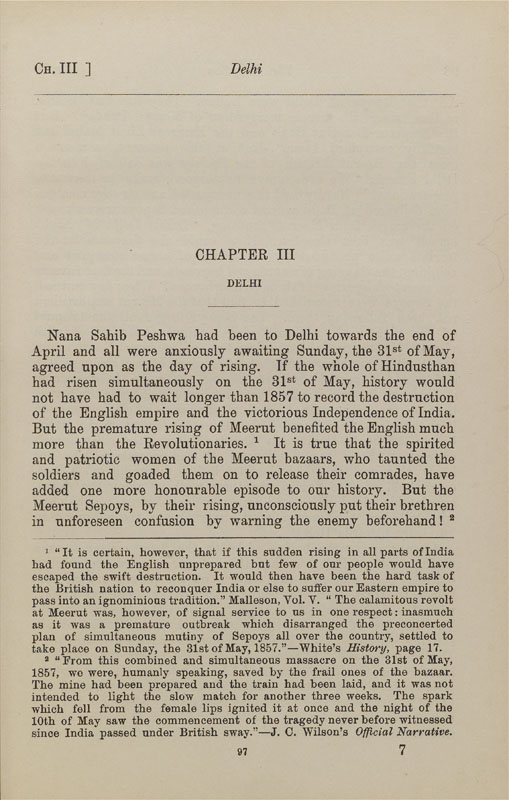Ch. in ]
Delhi
CHAPTER III
DELHI
Nana Sahib Peshwa had been to Delhi towards the end of
April and all were anxiously awaiting Sunday, the 31^* of May,
agreed upon as the day of rising. If the whole of Hindusthan
had risen simultaneously on the 31^* of May, history would
not have had to wait longer than 1857 to record the destruction
of the English empire and the victorious Independence of India.
But the premature rising of Meerut benefited the English much
more than the Revolutionaries. ^ It is true that the spirited
and patriotic women of the Meerut bazaars, who taunted the
soldiers and goaded them on to release their comrades, have
added one more honourable episode to our history. But the
Meerut Sepoys, by their rising, unconsciously put their brethren
in unforeseen confusion by warning the enemy beforehand! ^
^ "It is certain, however, that if this sudden rising in all parts of India
had found the English unprepared but few of our people would have
escaped the swift destruction. It would then have been the hard task of
the British nation to reconquer India or else to suffer our Eastern empire to
pass into an ignominious tradition." Malleson, Vol. V. " The calamitous revolt
at Meerut was, however, of signal service to us in one respect: inasmuch
as it was a premature outbreak which disarranged the preconcerted
plan of simultaneous mutiny of Sepoys all over the country, settled to
take place on Sunday, the 31st of May, 1857."—White's History, page 17.
8 "From this combined and simultaneous massacre on the 31st of May,
1857, wo were, humanly speaking, saved by the frail ones of the bazaar.
The mine had been prepared and the train had been laid, and it was not
intended to light the slow match for another three weeks. The spark
which fell from the female lips ignited it at once and the night of the
10th of May saw the commencement of the tragedy never before witnessed
since India passed under British sway."—J. C. Wilson's Official Narrative.
97 7
|








